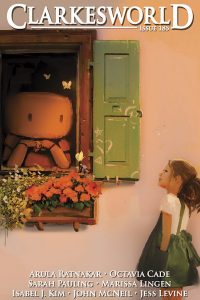Archita Mittra Reviews Dry Land by B. Pladek
 Dry Land, B. Pladek (University of Wisconsin Press 978-0-29934-394-1, 264pp, $18.95, tp) September 2023.
Dry Land, B. Pladek (University of Wisconsin Press 978-0-29934-394-1, 264pp, $18.95, tp) September 2023.
Dry Land, B. Pladek’s debut novel, is historical climate fiction that meditates upon man’s fraught relationship with the natural environment and the limits of magical powers, enlivened with evocative sketches of the Wisconsin wilderness. Set against the backdrop of the First World War, the story revolves around Rand Brandt, a young man whose affinity with nature manifests in a special ability – his touch can cause plants to grow in mere minutes. While concerned chiefly with forestry and environmental preservation, Dry Land also deftly explores the struggles of queer folk as they navigate a hostile world, along with the sacrifices that sustain communities and ecosystems.
Even before our protagonist discovers his ‘‘gift,’’ Pladek establishes Rand as somewhat of an outsider – more comfortable in the wilderness than in man-made environments. Aloof from his peers and further estranged on account of his implied bisexuality, Rand nevertheless has a rich interior life, and finds some solace with teammate and lover, Gabriel, and in his epistolary friendship with Jonna. The queer realities of these characters are frequently coloured by persecution, even as their relationships, like the environment, evolve with time.
As a forester, Rand wants to utilise his magical powers to repair ecosystems ravaged by lumbering, including Clearwater Marsh, which was an integral part of his childhood. From making flowers bloom, Rand quickly learns to grow entire trees with his touch. Yet when his ability is discovered by military personnel, his gift becomes a resource to be exploited – he is sent off to France as part of a logging crew, to grow timber for the Great War. With his German background, his part in the American war effort is also viewed with suspicion, leading to further alienation. Moreover, his strange gift also exacts a cost – anything he brings to life dies quickly.
Thus, as Rand pushes himself to his limits to grow forests out of fallow land, he is confronted with a newer, nuanced understanding of what it means to a part of the whole. He contemplates the differences between a garden and the un
that charted wild – while the former is an illustration of exerting control and taming ‘‘nature’’ into a pleasing aesthetic, the latter by definition defies efforts to be molded by human will. Slowly, Rand realises that a forest isn’t just a collection of trees, and ecosystems that have been systematically destroyed by indiscriminate logging cannot simply be healed by conjuring plants out of thin air. Consequently, Rand’s creations, beautiful and wondrous as they briefly are, wilt and wither, for his trees (which puzzle scientists and keen observers alike), are ‘‘without history,’’ not having faced the onslaught of time.
In a very interesting and satisfying twist, Pladek thus deploys magic to emphasise how there are no shortcuts to hard work, especially when it comes to conserving nature or healing an embittered relationship or making meaningful change in society. In this regard, the narrative also reminded me of Mary Shelley’s Frankenstein, which illustrates a similar truth, but from the opposite end – a scientist hastily tries to create life, and then, horrified, abandons his creation to the whims of fate. He sought to arrogate the power to confer life, while being unwilling to invest in the time, care, and nourishment required to give birth and raise a child. However, unlike Victor Frankenstein, Rand unexpectedly uncovers his unique ability and learns to gracefully accept its limits. By eschewing his role as some messianic saviour of nature, he is able to finally dedicate himself to preservation and restoration efforts in a more authentic manner. The narrative thus reiterates that any ecosystem is much more than the sum of its parts, and the path towards healing is always slow, laborious, full of sacrifices, and bolstered by the self-awareness to see beyond one’s self.
Quiet yet illuminating, Dry Land is a meticulously researched novel filled with careful details and thought-provoking exchanges that reward the reader for their pauses and patience. While Rand is on a ‘‘hero’s journey,’’ Pladek masterfully avoids formulaic fantasy tropes while delving deep into his protagonist’s interiority and searing self-realisations, without providing any black-and-white answers to the philosophical questions he raises or the complicated realities he depicts. Overall, Dry Land makes for an interesting, refreshing, and compelling read; recommended not just for cli-fi enthusiasts, but for anyone interested in a slow and contemplative tale.
Archita Mittra is a writer and artist, with a fondness for dark and fantastical things She completed her B.A (2018) and M.A (2020) in English Literature from Jadavpur University and a Diploma in Multimedia and Animation from St. Xavier’s College.
When she isn’t writing speculative fiction or drawing fanart, she can be found playing indie games, making jewelry out of recycled material, reading a dark fantasy novel, baking cakes, or deciding which new Tarot deck to buy.
She lives in Kolkata, India, with her family and rabbits.
This review and more like it in the December and January 2023 issue of Locus.
 While you are here, please take a moment to support Locus with a one-time or recurring donation. We rely on reader donations to keep the magazine and site going, and would like to keep the site paywall free, but WE NEED YOUR FINANCIAL SUPPORT to continue quality coverage of the science fiction and fantasy field.
While you are here, please take a moment to support Locus with a one-time or recurring donation. We rely on reader donations to keep the magazine and site going, and would like to keep the site paywall free, but WE NEED YOUR FINANCIAL SUPPORT to continue quality coverage of the science fiction and fantasy field.
©Locus Magazine. Copyrighted material may not be republished without permission of LSFF.






